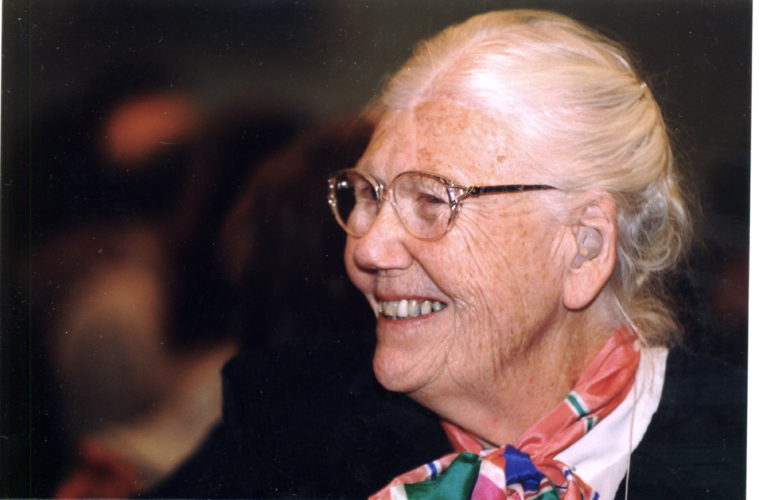Sociologist, poet, mother, and one of the most influential peace researchers of the twentieth century, Elise Boulding coined the concept of the 200-year present, a tool to expand our perception of time and connect us to the generations preceding and those succeeding us.
Elise Boulding was born in Norway in 1920 and moved to the USA with her parents when she was three years old. It was Germany’s attack on Norway in World War II that shook her and her family deeply: seeing her peaceful homeland violated, she recognized violence as a systemic global concern. At that point she began to engage in building peace, starting with anti-war activities, moving into the academic field, in sociology at Dartmouth College – where she developed the first Peace Studies program in the States.
Beside raising five children with her husband, Kenneth Boulding, she held many leadership positions in peace and social justice-related groups, from chairing the Women’s International League for Peace and Freedom (WILPF) to creating the International Peace Research Association (IPRA) to work with the United Nations through UNESCO and the University of the United Nations. She is considered to be one of the most influential peace researchers and activists of the 20th century.
The 200-year present: Expanding our sense of time and history
The 200-year present is a theory developed by Elise Boulding in 1990 and since then it has been widely used in the field of peace studies, among others. It is based on the assumption that, sometimes, people live in withdrawal from the fast and complex present they experience and which, without doubt, can be overwhelming at times. Further, it stems from the observation that we as human beings tend to live from one moment to the other without looking for a bigger, overarching relatedness of things that happen to us.
The 200-year present refers to a space of time that begins 100 years ago counted from today and ends with the 100th birthday of the children that are born today.
This habit is mirrored in media, politics, as well as other frames and deeply shapes public life. Although somehow everyone is affected by the things that are happening in society, nobody really cares about them. Something occurs, it becomes a subject of attention, maybe criticism and discussion, but vanishes as fast as it shows up, out of seemingly nothing. It seems as if political decisions were taken by people living in a reality far away from the everyday experience of many and it also seems that sometimes they do not even have a significant effect on the lives and experiences of the “common people”.
Based on the previously described situation, Boulding suggested an expansion of our perception of time that allows us to understand certain events better. By doing so, life can be seen as a broader phenomenon and when taking the 200-year present as an orientation, it becomes easier to navigate.
The 200-year present refers to a space of time that begins 100 years ago counted from today and ends with the 100th birthday of the children that are born today. This space is not comparable to a historical classification according to dates or an era, but it is rather in constant movement between 100 years of past and 100 years of future. This means, all of us are living in a social space that reaches out into the past and the future and therefore, we are automatically in contact with the borders of this space that contains up to five generations.
For the present this means that we are unavoidably in contact with the young and the old in our environment. By looking at this expanded time and space it becomes possible to gain a deeper and more contextualized understanding about phenomena that occupy our minds and to live today by looking at them more broadly.
On the left you can see Elise Boulding’s last poem, recorded by Virginia Benson shortly before her death in 2010. Benson visited her in the retirement home in Needham, Massachusetts, and immortalized words of the originally Norwegian ‘pioneer of peacebuilding’, as she is often called. It calls to mind a prediction for humanity’s future that she uttered in her book Into Full Flower: “But we humans can and will learn to live together as a family on this planet. There is a spirit in each of us that will make this possible. First, though, we must learn to listen to that spirit and to listen to one another.” It is this core value of relatedness we perceive throughout Elise Boulding’s work, academic as well as poetic, that touches us, her readers and listeners – and that, we dare say, goes even beyond 2110.
Poem by Elise Boulding
Everything is in the now.
The trees and the sky
And you and I
We’re in the now!
See the wind dancing in the trees.
Or is it the trees dancing in the wind?
Trees can’t dance without the wind
The wind can’t dance without the trees.
We all need each other
And I need you
And you need me.
So happy
I could lie here forever
But I won’t
I’m heavenward seeking.
For me, this is the perfect place
I could live up in the top of that tree
I can send myself up there on the top.
Now, I’m waving in the wind.
Everything needs everything.

